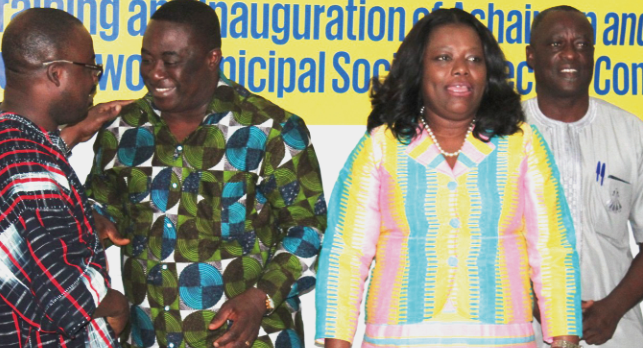
Gender ministry to implement social protection intervention
The Ministry for Gender, Children and Social Protection has set up two committees in the Greater Accra Region that will help in the effective, efficient and smooth implementation of social protection interventions at the local level.
The committees for the Ashaiman and the Ledzokuku Krowor municipal assemblies are the first two to be inaugurated out of 10 in 10 districts in five regions.
Others will be inaugurated at the Ho Municipal Assembly and the Adaklu District in the Volta Region, Fanteakwa District and East Akim Municipal Assembly in the Eastern Region, Efigya-Kwabre District and Ejisu Juabeng Municipal Assembly in the Ashanti Region, as well as Bolgatanga Municipal Assembly and Kassena Nantana District Assembly in the Upper East Region.
Members of the committees are made up of traditional leaders, representatives of civil societies and officials from the Social Welfare Department, National Health Insurance Authority, local government service and the Ghana Education Service.
The Minister for Gender, Children and Social Protection, Nana Oye Lithur, who inaugurated the two committees in Accra last Monday, said the government’s social protection policies were aimed at reducing poverty and vulnerabilities.
Commitment to SDGs
She said that was in line with the government’s commitment to the Sustainable Development Goals (SDGs) aimed at reducing poverty in the country.
She pointed out that the social protection programmes such as the Labour Intensive Public Works, the School Feeding Programme and the Livelihood Empowerment Against Poverty programme (LEAP) being implemented by the government, were going on at the community and district levels.
Nana Lithur, however, said the country had no committee, unit or a directorate at the local government level to supervise the implementation of the above-mentioned social protection programmes, as a result, the committees were established to ensure the success of the programmes.
In addition, she said the committees were to facilitate targeting, identification and selection of beneficiaries to profit from the NHIS, under the five-year African Health Market for Equity (AHME) project.
The AHME project, founded by the Bill Gates Foundation, was also being implemented in Nigeria and Kenya aimed at increasing the usage of quality essential health services by the poor.
In Ghana, the partnership for the implementation of the AHME project, was made up of the Gender Ministry, National Health Insurance Authority (NHIA), and the International Finance Cooperation (IFC), that finances and provides advice for private sector ventures in developing countries.
As part of the project, 126 persons had already been enrolled for the NHIS free of charge.
Other achievements
The Gender Minister further outlined various achievements by the ministry in its quest to reduce poverty in the country, pointing out that more than 13,000 elderly women and men aged 65 and above, had been registered across the country under the NHIS.
In addition, she mentioned that 11,249 inmates of the various prisons had been registered for the scheme.
Furthermore, she said 2,881 persons affected by the June 3 flood and fire disaster in Accra, 625 in Ashaiman, had been registered, while more than 3,400 persons with disability were also registered last week for the scheme.
Social protection key
For his part, the Greater Accra Regional Minister, Mr Joseph Nii Laryea Afotey Agbo, said social protection interventions could play a pivotal role in reducing and ending poverty, thereby promoting socio-economic development in the country, stressing that social protection interventions must be given the needed attention.
Touching on the African Health Market Equity programme, he said AHMA would address issues affecting the healthcare needs of the poor and also help strengthen social protection interventions in the country.
He said the clinic participation of the AHMA projects would have five key interventions namely social franchising, safe-care, medical credit fund, demand side financing and technology.
The Head of the Local Government Secretariat, Dr Callistus Mahama, called for capacity-building programmes for the committee members.
